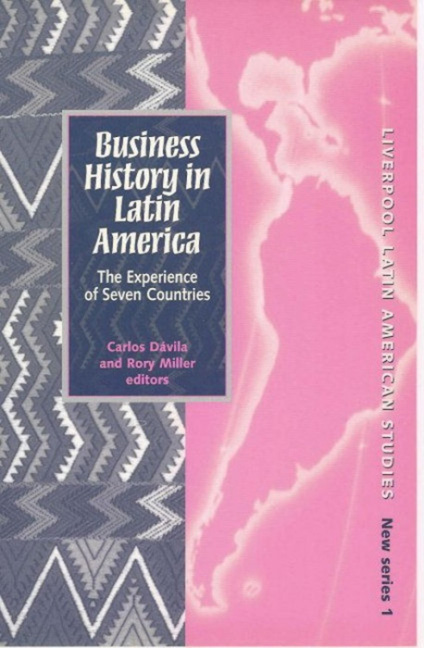Book contents
- Frontmatter
- Contents
- Preface
- Notes on Contributors
- Glossary
- 1 Business History in Latin America: an introduction
- 2 Business History in Argentina
- 3 Business History in Brazil from the mid-nineteenth century to 1945
- 4 Business History in Chile 1850–1945
- 5 Business History in Colombia
- 6 Regional Studies and Business History in Mexico since 1975
- 7 Business History in Peru
- 8 Economic and Business History in Venezuela
- 9 Bibliography
- Index
3 - Business History in Brazil from the mid-nineteenth century to 1945
- Frontmatter
- Contents
- Preface
- Notes on Contributors
- Glossary
- 1 Business History in Latin America: an introduction
- 2 Business History in Argentina
- 3 Business History in Brazil from the mid-nineteenth century to 1945
- 4 Business History in Chile 1850–1945
- 5 Business History in Colombia
- 6 Regional Studies and Business History in Mexico since 1975
- 7 Business History in Peru
- 8 Economic and Business History in Venezuela
- 9 Bibliography
- Index
Summary
The bibliography on Brazilian business history is limited but growing rapidly. In part this is due to the novelty of the subject, which is only now emerging as a distinct discipline or, more accurately, being consolidated as a clearly identifiable branch of economic history in the country. This process is not peculiar to the literature on Brazil. The same phenomenon can be observed elsewhere in the Latin American historiography and in writing about Asia, regions of Africa, and central and southern Europe. As in the case of Colombia, Chile and, possibly, Mexico, the study of Brazilian business history has been enriched by the quality of new research into economic history at national and regional level. Nevertheless, in all of these countries, economic history itself remains a young discipline (or a recently revived subject).
Economic history and business history: schooling the Brazilian literature
Writing on business history is indebted to various intellectual traditions which may be traced directly to distinct approaches in the general social science literature. Analyses of the history of the society and economy of Brazil before the Second World War reflect larger controversies about the nature of contemporary Latin American development which in turn provoked a reappraisal of the recent and the not-so-recent past. Three major schools may be identified. Many texts written during and after the 1950s and 1960s were shaped successively by structuralist and dependency perspectives, while in the last decade or so a recognisable revisionist current, based on new empirical research, has begun to emerge.
As is widely appreciated, structuralist theory took shape under the auspices of ECLA or CEPAL. Cepalino analyses were both descriptive and prescriptive and, at the same time, historical and predictive. In the period immediately after the Second World War developmentalists, in their concern to explain and remedy Latin America's perceived sluggish industrial growth, drew upon the ideas of Keynes and economic nationalists to challenge liberal economic orthodoxy, particularly in the areas of trade theory and the functions of the state. Focusing on internal bottlenecks and structural disjunctures in the world economy, cepalinos stressed the historic limits, and likely future costs, of export-led growth.
- Type
- Chapter
- Information
- Business History in Latin AmericaThe Experience of Seven Countries, pp. 43 - 59Publisher: Liverpool University PressPrint publication year: 1999

